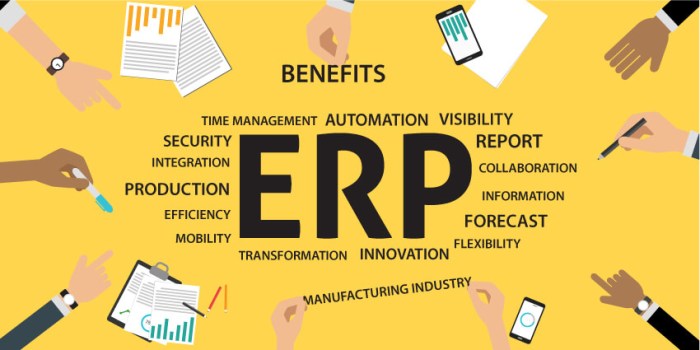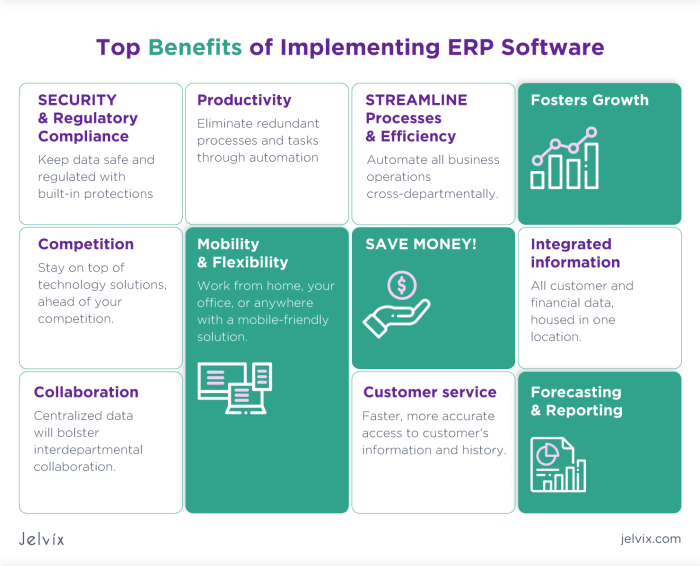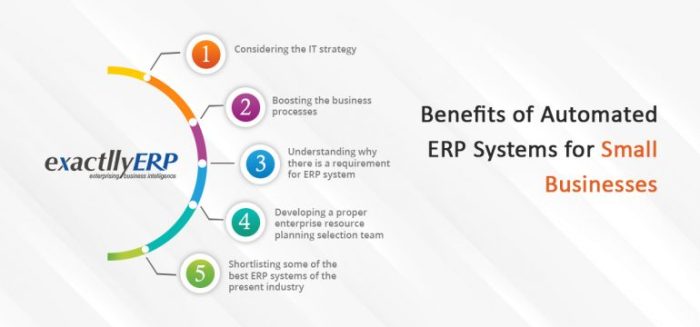What are the key benefits of using an ERP system for small businesses? In today’s competitive business landscape, small businesses are constantly looking for ways to improve efficiency, enhance data visibility, and gain a competitive edge. Enterprise Resource Planning (ERP) systems have emerged as a powerful tool for small businesses to achieve these goals. By integrating various business functions and departments, ERP systems streamline operations, provide real-time insights, and empower businesses to make informed decisions.
ERP systems offer a comprehensive suite of tools that can transform the way small businesses operate. From inventory management and order processing to financial accounting and customer relationship management, ERP systems automate tasks, centralize data, and improve collaboration, ultimately leading to increased productivity, better customer service, and enhanced financial performance.
Improved Efficiency and Productivity: What Are The Key Benefits Of Using An ERP System For Small Businesses
An ERP system can be a game-changer for small businesses, particularly in terms of streamlining operations and boosting efficiency. By integrating various departments and functions, ERP software centralizes data, automates processes, and eliminates redundancies, leading to significant improvements in productivity.
Automating Business Processes
ERP systems automate many routine tasks, freeing up valuable time for employees to focus on more strategic initiatives.
- Inventory Management: ERP systems provide real-time visibility into inventory levels, enabling businesses to track stock, manage reorder points, and optimize inventory levels. This helps prevent stockouts and overstocking, reducing storage costs and minimizing waste.
- Order Processing: Automating order processing streamlines the entire order fulfillment cycle. ERP systems can handle tasks such as order entry, order confirmation, shipping, and invoicing, reducing errors and speeding up delivery times.
- Payroll: ERP systems automate payroll calculations, deductions, and tax filings, eliminating manual errors and saving time for HR departments. They also facilitate direct deposit, ensuring employees receive their paychecks on time.
- Customer Relationship Management (CRM): ERP systems can integrate with CRM software, providing a comprehensive view of customer interactions. This enables businesses to personalize communication, track customer preferences, and provide better service.
Enhanced Data Visibility and Insights

Imagine having a single source of truth for all your business data, providing a comprehensive view of your operations across departments. This is the power of an ERP system. By centralizing data from finance, sales, inventory, and other areas, ERP systems offer unparalleled visibility into your business, enabling you to make informed decisions and drive strategic initiatives.
Data-Driven Insights for Improved Decision Making, What are the key benefits of using an ERP system for small businesses
With a consolidated view of your business data, you can gain valuable insights into trends, patterns, and areas for improvement. This data can be analyzed to identify opportunities for growth, optimize processes, and mitigate risks. For instance, by analyzing sales data, you can identify your most profitable products, customer segments, and seasonal trends. This information can then be used to develop targeted marketing campaigns, optimize inventory levels, and improve customer service.
“Data is the new oil. It’s valuable, but if unrefined it cannot really be used. It has to be changed into gas, plastic, chemicals, etc. to create a valuable entity that drives profitable activity; so must data be broken down, analyzed for it to have value.”
Clive Humby, Data Scientist
- Sales and Marketing Insights: Analyze sales data to identify top-performing products, customer segments, and seasonal trends. This information can be used to develop targeted marketing campaigns, optimize inventory levels, and improve customer service.
- Financial Performance Analysis: Track financial performance metrics such as revenue, expenses, and profitability. This data can be used to identify areas for cost optimization, improve budgeting, and make informed financial decisions.
- Inventory Management: Monitor inventory levels, track stock movement, and identify slow-moving items. This information can be used to optimize inventory levels, reduce waste, and improve supply chain efficiency.
- Customer Relationship Management (CRM): Track customer interactions, manage customer data, and identify customer needs. This information can be used to personalize marketing campaigns, improve customer service, and increase customer satisfaction.
Better Financial Management
Small businesses often struggle with managing their finances effectively. ERP systems provide a comprehensive solution to this challenge by integrating financial processes, streamlining workflows, and providing valuable insights.
Real-Time Financial Reporting and Automated Reconciliation
Real-time financial reporting is a crucial aspect of effective financial management. ERP systems provide businesses with up-to-the-minute visibility into their financial position, enabling them to make informed decisions quickly. This real-time data allows businesses to track revenue, expenses, and cash flow, identify potential issues, and take corrective action promptly.
- Automated Reconciliation: ERP systems automate the reconciliation process, reducing manual effort and errors. This eliminates the need for time-consuming manual tasks, freeing up staff for more strategic activities.
- Improved Accuracy: By automating data entry and calculations, ERP systems minimize human error, ensuring greater accuracy in financial reports. This leads to more reliable financial information for decision-making.
- Enhanced Transparency: Real-time reporting fosters transparency within the business. Managers and stakeholders have access to the latest financial data, enabling them to understand the company’s performance and make informed decisions.
Improved Customer Relationship Management (CRM)

ERP systems can be a game-changer for small businesses looking to improve their customer relationships. By integrating CRM functionalities, these systems provide a comprehensive platform for managing customer interactions, streamlining processes, and ultimately boosting customer satisfaction and loyalty.
Centralized Customer Data
A key advantage of ERP systems is their ability to consolidate customer data from various sources into a single, centralized platform. This eliminates the need for businesses to rely on disparate systems or spreadsheets, providing a unified view of customer interactions and information. This centralized data repository empowers businesses to gain a deeper understanding of their customers and personalize their interactions.
- Customer Profiles: ERP systems can create detailed customer profiles that capture essential information such as contact details, purchase history, preferences, and service requests. This comprehensive view enables businesses to tailor their communication and offerings to individual customer needs.
- Interaction History: Every interaction with a customer, whether it’s a phone call, email, or website visit, is recorded and accessible within the ERP system. This detailed interaction history provides valuable insights into customer behavior and allows businesses to identify potential issues or areas for improvement.
- Sales and Marketing Data: ERP systems can track customer engagement with marketing campaigns, sales opportunities, and promotional activities. This data helps businesses measure the effectiveness of their campaigns and optimize their marketing strategies for better results.
Enhanced Collaboration and Communication
An ERP system serves as a central hub for information sharing, enabling seamless communication and collaboration among departments and employees. This centralized platform fosters a more streamlined workflow, leading to improved decision-making and increased efficiency.
Real-time Data Sharing and Online Collaboration Tools
Real-time data sharing is a cornerstone of enhanced collaboration. ERP systems provide a single source of truth, allowing all stakeholders to access the latest information, regardless of their location or department. This eliminates the need for manual data transfer, reduces errors, and ensures everyone is working with the same information. Online collaboration tools, integrated within the ERP system, further facilitate teamwork.
These tools enable teams to work together on projects, share documents, and communicate in real-time, regardless of their physical location.
For example, sales teams can access real-time inventory data to accurately inform customers about product availability, while production teams can use the same data to adjust production schedules based on demand.
Scalability and Growth Potential

ERP systems can be a valuable asset for small businesses looking to scale and grow. They provide a scalable platform that can adapt to the changing needs of a business as it expands. This means that an ERP system can handle increasing data volumes, user numbers, and business processes without compromising performance or functionality.
Handling Increasing Data Volumes
As a small business grows, the amount of data it generates also increases. This can include customer information, financial records, inventory data, and more. ERP systems are designed to handle large volumes of data efficiently. They use robust databases and data management tools to store, organize, and retrieve data quickly and easily. This ensures that businesses can access the information they need to make informed decisions, even as their data volumes grow.
Implementing an ERP system can be a significant investment for small businesses, but the benefits far outweigh the costs. By leveraging the power of ERP technology, small businesses can unlock their full potential, optimize operations, and position themselves for sustainable growth in the long run. With its ability to streamline processes, enhance data visibility, and improve financial management, an ERP system can be a game-changer for any small business looking to achieve operational excellence and compete effectively in the market.
FAQs
What are the common challenges faced by small businesses when implementing an ERP system?
Common challenges include cost, implementation complexity, data migration, user adoption, and integration with existing systems. It’s important to choose an ERP system that is tailored to the specific needs of the business and to plan for a smooth implementation process.
How can small businesses choose the right ERP system for their needs?
Small businesses should consider factors such as industry, size, budget, and specific requirements. It’s essential to research different ERP vendors, compare features and pricing, and seek recommendations from other businesses.
What are the best practices for successful ERP implementation?
Best practices include clear planning, stakeholder involvement, effective communication, proper training, and ongoing support. It’s crucial to have a dedicated team to manage the implementation process and ensure that the system is properly integrated with existing systems.